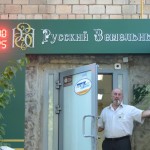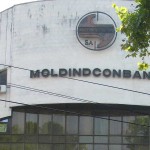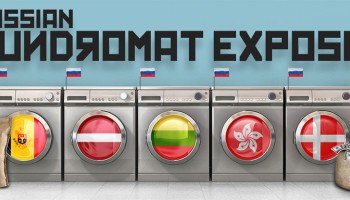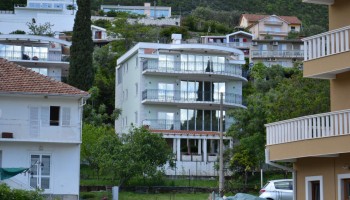When US$ 20 billion in dirty money swirled out of Russia and into Europe in one of the biggest money laundering operations yet uncovered in Eastern Europe, investigators in Moldova and Russia set to work to track down how it was done and who was behind it.
Reporters for the Organized Crime and Corruption Reporting Project (OCCRP) talked with Alexander Grigoriev, a banker whose name shows up in the scheme. He denies he ever received money personally and his partner says if the transfers were not legal, then it’s the Russian government’s responsibility to explain what happened.
About US$ 21 million reached the Moldovan bank accounts of Grigoriev, the head of the Russian Land Bank (RZB in Russian), a bank that investigators say was involved in the scheme.
Grigoriev managed RZB with Igor Putin, the cousin of Russian President Vladimir Putin. In March 2014 the Russian Central Bank revoked RZB's banking license for violations of anti-money-laundering regulations.
According to Moldovan authorities, from 2010 through the spring of 2014, organized criminals in Russia moved US$ 20 billion in criminal proceeds through a complex cleanse-and-spin cycle OCCRP dubbed The Laundromat.
It involved dozens of offshore companies, banks, fake loans, and proxy agents. Judges in the tiny Republic of Moldova provided coverage for the whole process by ruling that fake transactions were legit, and the freshly cleaned funds were then dispersed across Europe.
Law enforcement officials say that banks in Russia, Moldova and Latvia played a crucial role in the massive money-laundering scheme. En route to Europe, all of the Russian money passed through a controversial Moldovan bank, Moldindconbank. Law enforcement officials in Chisinau, Moldova's capital, were able to trace some of the money.
The Banker's Money
Documents reviewed by OCCRP in Moldova show that from December 2013 to May 2014, Grigoriev received US$ 20.6 million and €750,000 (US$ 956,000) in his Moldindconbank accounts. The money came from two companies, Saagton SRL from Moldova and the South African-based Dodia Proprietary Limited. They, in turn, had received the funds from two British-based paper companies in the Laundromat cycle, Seabon Limited and Westburn Enterprises.
Both Dodia and Saagton have a history with Moldindconbank. Dodia is involved in a court case in Chisinau, the capital of Moldova, claiming a Moldindconbank shareholder owes it about US$ 20 million. Saagton is registered at the same Chisinau address as the headquarters of a firm connected to the family of Veaceslav Platon, a controversial Moldovan businessman involved with Moldindconbank. When OCCRP reporters contacted Platon, he refused to comment on the money-laundering investigation.
From Moldova, Grigoriev wired the money he received from Dodia and Saagton to accounts he held in two Monaco banks. The same documents show that in May 2014, Grigoriev wired €250,000 (US$ 318,000) to the Soho Hotels company, and to a tennis club, both in the Montenegrin coastal town of Bar. OCCRP has previously written about Grigoriev's investments in that Balkan country.
These include a luxury hotel and a tennis club in Bar, a port in southern Montenegro on the Adriatic Sea. The club was established in 2009 and, in the last two years, has held a series of European, Mediterranean and Balkan championships in indoor sports.
A reporter for OCCRP contacted two of the founders of the tennis club, local businessman Ljubo Kocovic and Boris Mijovic, who says he was a police chief for six years but did not say where. Kocovic is an influential member of the ruling Democratic Party of Socialists of Montenegro (DPS). He heads the party’s Bar board and is a member of the local assembly. Mijovic is the municipality’s secretary. Both claimed they did not know Grigoriev and said they are no longer associated with the club. When OCCRP sought details of Grigoriev’s financial involvement in the club, Mijovic’s wife Nina, who is the club’s secretary, provided no details about Grigoriev but in a later e-mail said the club's activities are in accordance with the law.
Subsequently his lawyer, Nikola Kavedzic, first warned OCCRP against publishing a story alleging wrongdoing by Grigoriev, noting that Grigoriev is a respected citizen who had won a case in Russia against media who made false allegations. He added that his client is not under investigation in Moldova or Russia.
Several days later he confirmed that Grigoriev lent €130,000 (US$ 164,000) to the tennis club to expand the complex, including construction of another tennis court and additional facilities.
According to the lawyer, Grigoriev plans to invite international tennis stars to promote the development of tennis in Montenegro as well as build the country’s global reputation.
Some of the many awards and diplomas that Alexander Grigoriev received in Montenegro:
Grigoriev was not the only banker to handle Laundromat money. RZB shareholder Beslan Bulguchev received US$ 1.4 million from Dodia in another Moldindconbank account in Moldova.
The Bankers' Denial
Reporters for OCCRP could not reach Bulguchev for comment, but met Alexander Grigoriev in Moscow in a restaurant next to the Russian Government building. He was accompanied by Vladimir Semago, a former deputy in the Russian Duma and head of the board of the Moscow based bank Zapadny. Moldovan law enforcement says that bank is another bank in the Laundromat. Grigoriev used to own shares in Zapadny.
“It is difficult to comment on this story, because I don’t know the answers to your questions. I can just repeat what I had told you for the previous story: RZB and Zapadny, where I had shares, made absolutely legal deals in currency trading with Moldindconbank. All the deals were made in the territory of Russia.”
-Grigoriev said
“We didn’t send any money to foreign companies with accounts in Moldovan banks. We didn’t hear any blame from the Central Bank regarding these deals. What happened to this money in Moldova? It is not our question. Why should we be responsible for operations of a foreign bank or clients of a foreign bank? How, in general, should we know anything about them?”
As for payments into his personal accounts, Grigoriev insists that he has never opened any accounts in Moldindconbank. “It is very easy to check. You can’t open an account without your physical presence, without a signature. And I visited Moldova for the first time in July 2014.”
“I have two explanations for this mistake: somebody faked my signature, or somebody had the intent to commit this mistake in documents transmitted to you. I suppose it was done to smear me and to distract attention from the real organizers of the scheme,” said Grigoriev.
Border logs OCCRP has obtained contradict Grigoriev’s claim that he only visited Moldova in July 2014. They show two visits, in May and June of 2014. Both times he arrived by plane from Moscow and left from the Chisinau airport after no more than seven hours.
“I would like to point your attention to the main, as I believe, fact,” said Semago, who was a partner with Grigoriev in the Zapadny bank. “The Central Bank was constantly checking RZB and Zapadny. And the regulator had no questions about the deals with Moldindconbank.”
“I am quite sure that they knew all about these operations of billions of dollars. If they haven’t stopped them, then it means that they were legal. If not, then it means that Central Bank was somehow connected to the organizers of the scheme. So the main question in this story is, what is the origin of that money? And why Russian regulators and law-enforcement don’t want to tell us the truth about it? If they are afraid or don’t have enough abilities I am ready to help them in their investigation.”
Russian authorities did not comment for this story.















